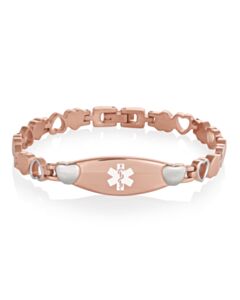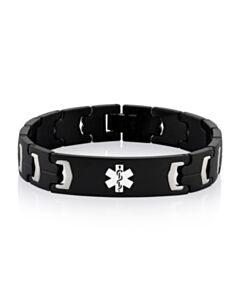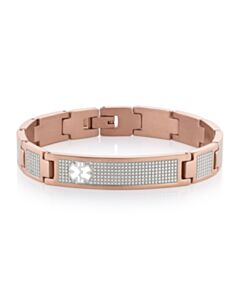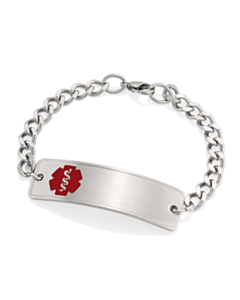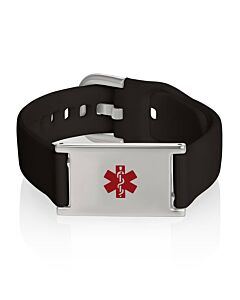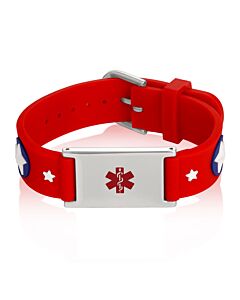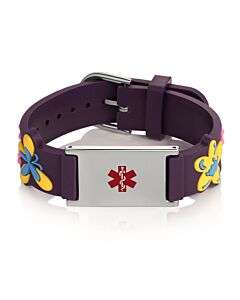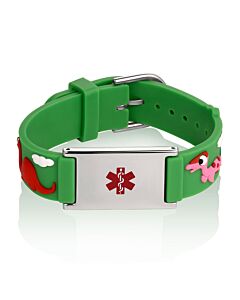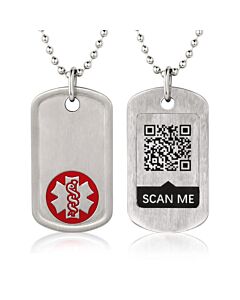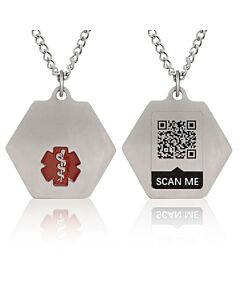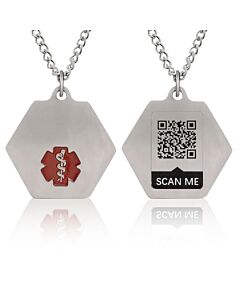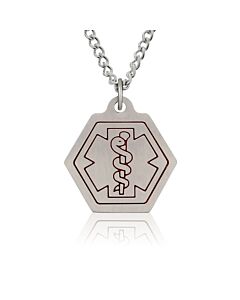Medical IDs for Wheat Allergy


A child or adult with a wheat allergy can develop debilitating symptoms within minutes after consuming wheat or inhaling wheat. Anaphylaxis is a life-threatening allergic response that can occur in some cases. If exposure to wheat leads to an emergency situation it is recommended to wear a wheat allergy medical ID bracelet.
Wheat allergy is one of the most common childhood food allergies but it can also affect adults. It affects approximately 0.5 percent of children and up to 1.2 percent of adults in the United States. Studies show that wheat is the food that most commonly triggers a severe and immediate allergic reaction (anaphylaxis) in people over 18 years of age.
List of foods that may include wheat proteins
Mayo Clinic recommends avoiding these ingredients and food if you have a wheat allergy.
|
|
Some people are allergic to just one of the proteins in wheat, while others may be allergic to two or more. Having an allergy to one or multiple types of wheat protein merits wearing a medical ID.
“Wear a medical alert bracelet or necklace with your allergy information.” - Stanford Children's Health
Severe Symptoms of Wheat Allergy
The body's immune system causes symptoms of wheat allergy. Exposure to a wheat protein (albumin, globulin, gliadin, and gluten) primes the immune system for an allergic reaction. Even if an allergic person tries to avoid wheat altogether, wheat is found in many foods, including some you might not suspect. An allergic reaction can also be caused by cross-contamination.
- Swelling and tightness in the throat
- Difficulty swallowing
- Tightness and pain in the chest
- Difficulty breathing
- Pale or bluish skin
- Weak pulse
- Life-threatening drop in blood pressure
Source: Medical News Today
Medical IDs and Wheat Allergies in Emergency
Symptoms of wheat allergy can cause throat swelling making it difficult to breathe and speak. It can prevent patients in communicating critical health information, especially for young children.
According to the American College of Allergy, Asthma & Immunology, people who have previously experienced only mild symptoms may suddenly experience anaphylaxis.
This is why a medical ID is essential. Unless a child or adult with wheat allergy wears a medical ID bracelet or necklace, symptoms can be misdiagnosed and delay life-saving treatment such as an epinephrine injection or EpiPen shot.
"A medical identification bracelet that describes the allergy and need for emergency care can help if you experience anaphylaxis and can't communicate." - Mayo Clinic
What to Engrave on a Wheat Allergy Medical ID


Wearing a custom engraved medical alert ID for wheat allergy is necessary for safety and peace of mind. Information found on a medical ID can make the difference in avoiding accidental exposure to wheat and receiving appropriate care in emergencies.
- Name
- Wheat allergy – allergy can be abbreviated to ALGY on your medical ID.
- Mention any other allergies and medical conditions, i.e. asthma, diabetes, or autism.
- Epi-Pen information – alert others that epinephrine injection is needed in an emergency and where it can be found. This can be engraved as: give EpiPen, give epi, epi in bag or epi in my purse, for example.
- Emergency Contact – especially if a child is wearing the medical ID, list parents' emergency numbers or a prompt to immediately call 911.
Wheat Allergy Bracelet & Wristband Options for Adults
The most common medical ID jewelry choice for wheat allergy is a bracelet or wristband. Offered in many different styles, metal types, and colors to help you select the right wheat allergy bracelet for you.
Wheat Allergy Bracelets for Kids
We also offer a comprehensive selection of wheat allergy bracelets for kids, from toddler to teenager.
Wheat Allergy Necklaces
Protect yourself in a medical emergency with a wheat allergy necklace. We offer a huge selection of different medical ID necklaces varying by style, metal type, chain type, chain length, pendant color, and more!
Why a Wheat Allergy Card isn’t Enough
In emergency situations, first responders are trained to first look for key medical information on a bracelet or necklace. If the person only has a wheat allergy card in their wallet, medical professionals will not be aware of the vital medical information and open the possibility of misdiagnosing or worsening the situation.
Frequently Asked Questions about Wheat Allergy Medical ID
Should I wear a medical alert bracelet for wheat allergy?
You should wear a medical alert bracelet for a wheat allergy if you are at risk of an anaphylactic reaction to wheat exposure, or if your medical provider recommends it. Make sure to include any “EpiPen” information on your medical ID if needed.
What is the medical alert symbol for wheat allergy?
There is no official wheat allergy symbol so it is best to engrave “Wheat Allergy” or “ALGY: Wheat” on your medical ID. Make sure to include any other vital life saving information and emergency contacts if possible.
Should I still carry a wheat allergy card if I wear a wheat allergy alert bracelet?
It’s always a good idea to carry a wheat allergy card, even if you wear a bracelet or a necklace. On the wallet card you can expand upon any other critical medical information and use it for non-emergency situations.



 - UK
- UK  - Canada
- Canada  - Australia
- Australia 
